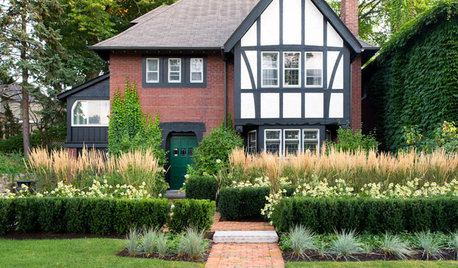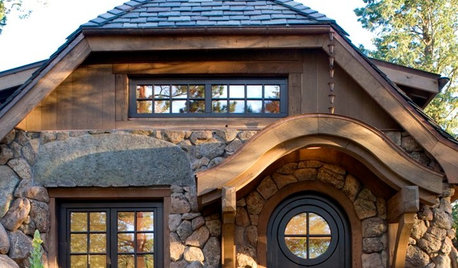i discovered a nest of yellow jackets today
gardningscomplicated
13 years ago
Related Stories

LANDSCAPE DESIGNHow Low Can Hedges Go? Discover Unusual Garden Borders
Short enough to step over, high enough to be a stretch ... check out these radically different hedge styles and tell us your opinion
Full Story
ACCESSORIESDesigns Worth Discovering: Rookwood Pottery Tile
Get to know the company that put American ceramics on the map in the 1880s to see why its tiles are newly popular today
Full Story
DECORATING GUIDESPaper Chase: Wallpaper Through the Ages to Today
Get on a decorating roll with a wall covering that's been around for centuries but comes in more exciting designs than ever
Full Story
COLORDiscover White’s Surprising Power to Energize Every Room
Using white in different ways gives you limitless options for light, color and creativity
Full Story
HOUZZ TOURSDiscover a Hobbit House Fit for Bilbo Baggins
Part art studio, part guesthouse and all charm, this imaginative Colorado cottage looks like it grew right out of the earth
Full Story
DECLUTTERING10 Types of Clutter to Toss Today
Clear the decks and give the heave-ho to these unneeded items
Full Story
MIDCENTURY STYLEHow to Get Midcentury Modern Style Today
Use the building blocks of midcentury modern design to create a new version for your own life and style
Full Story
COLORNew Reasons to Love and Decorate With Yellow
Learn some of this controversial color’s history and associations — you might just see it in a different light
Full Story
COLORColor of the Week: Spring Blossom Yellow
Tired of winter yet? Bring on spring with our featured color of the week
Full Story
FUN HOUZZEverything I Need to Know About Decorating I Learned from Downton Abbey
Mind your manors with these 10 decorating tips from the PBS series, returning on January 5
Full Story



mister_potato_head
bigtrout
Related Discussions
Smothering yellow jacket nest in compost pile
Q
Should I remove a yellow jacket nest?
Q
Yellow Jacket nest above front door (or is it honeybees?)
Q
Nest in wall of house: bee or yellow jacket
Q
gardningscomplicatedOriginal Author
wordwiz
laceyvail 6A, WV
planatus
vtguitargirl
caroliniannjer
thefarmguy
noinwi
nancyjane_gardener
gardningscomplicatedOriginal Author
gardningscomplicatedOriginal Author
wordwiz
zeedman Zone 5 Wisconsin
gardningscomplicatedOriginal Author
dancinglemons
gardningscomplicatedOriginal Author
caroliniannjer
noinwi
ga_karen
jnfr
gardningscomplicatedOriginal Author
woodinvirginia
User
cinsay
gardningscomplicatedOriginal Author
veeta
gardningscomplicatedOriginal Author